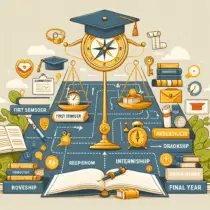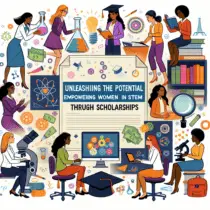Unleashing Your Potential: Crafting a Winning Scholarship Essay
When it comes to pursuing higher education, many students face a significant hurdle – the cost. College tuition fees continue to rise, making it challenging for students from all walks of life to access educational opportunities. However, scholarships provide a glimmer of hope for those seeking financial assistance. Securing a scholarship can alleviate the burden of tuition fees and open doors to transformative educational experiences.
The path to securing a scholarship often begins with crafting a winning scholarship essay. This article will guide you through the process of unleashing your potential and writing an essay that stands out among the competition.
Understanding the Scholarship Essay
A scholarship essay is a crucial component of your application that allows you to showcase your unique qualities, experiences, and aspirations. It gives the selection committee insights into who you are as an individual and what sets you apart from other applicants. In essence, it is your chance to make a lasting impression and convince decision-makers that you deserve their support.
While each scholarship may have specific requirements or prompts, there are common elements that should be present in any winning essay:
1. Clear Introduction:
The introduction serves as your hook, grabbing the reader’s attention right from the start. It should provide a glimpse into your story and introduce the central theme or idea that will be developed throughout the essay.
2. Compelling Narrative:
Your essay should weave together personal anecdotes, achievements, challenges overcome, and lessons learned in a cohesive and engaging manner. This narrative approach provides depth and authenticity while showcasing your growth and development.
3. Highlighting Personal Values:
Scholarship committees are not only looking for academic excellence but also individuals who align with their organization’s mission and values. It is essential to reflect on your personal values and demonstrate how they align with the scholarship’s objectives.
4. Concrete Examples:
Avoid vague statements and generalizations. Instead, provide specific examples that illustrate your qualifications and accomplishments. Showcasing concrete evidence gives credibility to your claims and makes your essay more impactful.
5. Reflection and Future Goals:
Towards the end of your essay, reflect on the experiences described earlier and articulate how they have shaped your future goals. Demonstrating a clear vision for your educational and career aspirations shows ambition and long-term commitment.
Unleashing Your Potential: Tips for Writing a Stellar Scholarship Essay
Now that you understand the essential components of a scholarship essay, it’s time to dive into crafting a winning piece. Here are some tips to help you unleash your potential:
1. Start Early:
Procrastination is the enemy of excellence. Give yourself plenty of time to brainstorm ideas, draft, revise, and polish your essay. Starting early allows for multiple iterations, ensuring that you present the best version of yourself.
2. Read Instructions Carefully:
Scholarship applications often come with specific instructions or prompts. Failing to adhere to these guidelines can jeopardize your chances of being considered. Take the time to understand what the scholarship committee wants from applicants before diving into writing.
3. Be Authentic:
Avoid trying to be someone you’re not in an attempt to impress the committee. Instead, embrace your unique voice, experiences, and perspectives. Be honest about who you are and what drives you; authenticity resonates with readers.
4. Tell Your Story:
One of the most effective ways to engage readers is through storytelling. Share personal anecdotes, challenges overcome, and moments of growth. Allow the reader to get to know you on a deeper level.
5. Edit and Revise:
Writing is a process that requires refinement. After completing a draft, set it aside for a day or two before revisiting it with fresh eyes. Look for any areas that can be strengthened, whether it’s clarifying your message or improving the flow of your essay.
6. Seek Feedback:
Don’t hesitate to reach out to trusted mentors, teachers, or family members for feedback on your essay. They can provide valuable insights and help identify areas that may need improvement.
Frequently Asked Questions
Q: Can I reuse the same essay for multiple scholarship applications?
A: While there may be some overlap in prompts or themes among scholarships, it’s important to tailor your essay to each specific application. Adapting your essay ensures that it aligns with the scholarship’s requirements and objectives.
Q: How long should my scholarship essay be?
A: The ideal length can vary depending on the scholarship’s instructions. Some applications may specify a word count limit, while others may request a specific number of pages. It’s crucial to follow these guidelines to avoid disqualification.
Q: Should I include personal challenges in my essay?
A: Including personal challenges can showcase resilience and personal growth. However, be mindful of how you frame these challenges – focus on how you overcame them rather than dwelling solely on negative experiences.
In conclusion,
Crafting a winning scholarship essay requires time, effort, and introspection. By understanding the essential components and following the tips outlined in this article, you can unleash your potential and increase your chances of securing the scholarship you deserve. Remember, your essay is an opportunity to showcase your unique qualities and stand out among countless other applicants. Embrace your story, be authentic, and let your passion shine through.






